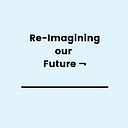Re-Imagining Success
During the pandemic a disquieting trend (especially amongst teenagers), is growing Dysphoria, a general discontent, ennui, lethargy. The very opposite of the Euphoria, the happiness and joy we all crave — well demonstrated by 13th century poet and Sufi mystic Jalāl ad-Dīn Muhammad Rūmī. He found the whirling dervishes practiced and embodied euphoria — “intoxicated love and ecstasy”, even during times of despair and difficulty.
How do we break out of what Theologian William James termed our “torn-to-pieces-hood”? Perhaps our self — esteem is too dependent on what society, institutions, communities, parents, peers think we should be, do, achieve, and own?
Maybe it’s time to become aware that our significance, self-worth is not dependent on wealth and power, but rests in higher values? Maybe it is time to re-define success? Time to appreciate the beauty of “imperfection”, shift to being less egoic, adopt and start to learn how to practice the qualities and values that make us truly human : patience, compassion, reflection, humour, inclusion, wisdom.
I captured this in a 10Ps model, the small p’s representing extrinsic, egoic values and the big Ps representing inner values to cultivate:
Straddling both sets but emphasising the big Ps requires a measure of kenosis(self-emptying), metanoia (thinking with a larger mind) and eunoia(a more beautiful mind).
This global pandemic is exposing many of the flaws of our modern systems and common ways of being in, and interacting with, the world. Our collective identity is being questioned. Modernity was built on extraction and violence. Many of the things that we have done, and called successes, now are being labeled as problems, or failures (i.e. plastics and pesticides).
Personally, I (Dan) came to the conclusion that the work I was doing, within the flawed system, was leading to more harm than good. I felt that the better I did at my job, the worse the impact there would be on the wider-world. My successes were failures. This led me to leave my job.
Imagine asking these same questions (Is what I am doing right? Why are things the way they are? Can I/We do things in a different way?), as a slave owner, at a time where slavery was common. These are not easy questions to ask, and to speak out with courage, compassion, and practicality, is perhaps even more difficult.
I understand not everyone has the privilege to leave their jobs. But, we all have the ability to feel, experience, reflect and express. We all have a perspective. We all have a voice. In the process of honest, embodied, inquiry, simply showing up and being kind to yourself and your neighbors is one of the greatest successes possible.
In showing up we have tapped into the big Ps, begun transforming. We contribute to the collective lessening of dysphoria and disconnectedness and the increasing of euphoria and connectedness. And there within rests the possibility to BE (which is waking up, growing up, cleaning up and showing up!).
Lead Author: Graham Williams (first 4 paragraphs)
Graham is the author of the book The Halo and the Noose, the Power of Storytelling and Story Listening in Business Life. Graham offers a series of workshops ranging from applying Da Vinci for personal growth to exploring African Stories. You can reach out to Graham through his website and/or via e-mail, centserv@iafrica.com.
Anchor Author: Daniel Rudolph
Daniel Rudolph is interested in exploring alternative, experiential learning opportunities for people of all ages. He is passionate about forming community, and building public spaces for meaningful, transformational gathering. Currently he is spending a lot of his time learning juggling and facilitating gatherings. He also enjoys writing and sharing poetry. Daniel is a very curious and playful person and is always open for creative collaborations.
